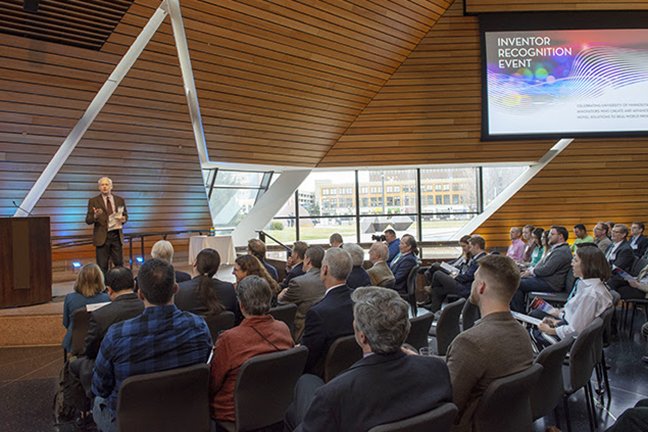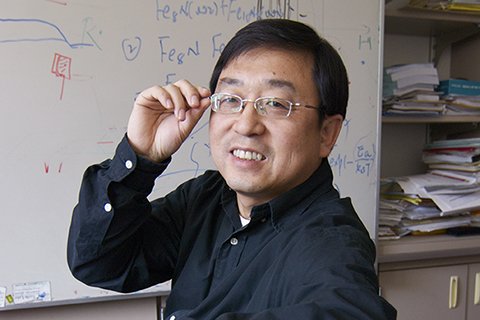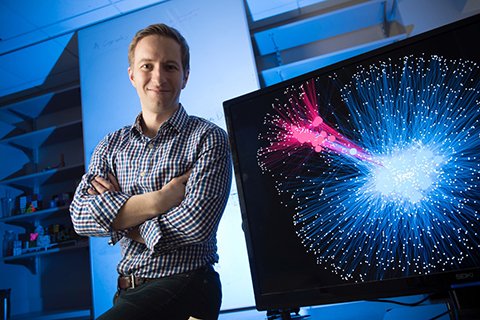Two CSE entrepreneurial faculty receive Innovation Awards

More than 95 other CSE faculty honored for their licensed or patented research
MINNEAPOLIS / ST. PAUL (04/02/2019) — Two College of Science and Engineering faculty were honored by the University of Minnesota as 2019 Innovation Award winners for their groundbreaking research and entrepreneurial spirit. They received recognition at the 2019 Inventor Recognition Event presented by the Office of the Vice President for Research and U of M Technology Commercialization. The event celebrated the recent achievements of University researchers and the breakthroughs that have resulted from their efforts.
Entrepreneurial Researcher Award

Professor Jian-Ping Wang, who holds the Robert Hartmann Chair in the Department of Electrical and Computer Engineering, received the Entrepreneurial Researcher Award.
Jian-Ping Wang researches how the “spin” of an electron and its associated magnetism, rather than its charge, can be used as the basis for next-generation computing technologies that are faster, smaller and more energy-efficient.
Among the results of Wang’s research are a new material and process for making magnets that could replace the expensive and environmentally costly rare earth metals vital to wind turbines, hybrid/electric vehicles, hard disk drives and generators (the basis for University startup Niron Magnetics), as well as a portable device that quickly and accurately screens patients for early signs of a variety of disease and health conditions (the basis for startup Zepto Life Technology).
Committee’s Choice Award

Associate Professor Dan Knights, a computer scientist and quantitative biologist in the University of Minnesota’s College of Science and Engineering and College of Biological Sciences, was part of a team of inventors behind CoreBiome, a University startup launched in 2017 that analyzes communities of microbes for human health, agricultural, and environmental applications.
The startup won the Committee’s Choice Award. Knights’ co-inventors are Kenneth Beckman, U of M Genomics Center and Daryl Gohl, U of M Genomics Center.
Their suite of technologies enable microbiome analysis with unprecedented speed, reproducibility, and accuracy, allowing their customers to harness big data to create breakthrough products and therapies. The startup was acquired by OraSure Technologies Inc. in 2019.
Licenses and patents
In addition to the two top award winners, the Inventor Recognition Event recognized more than 95 College of Science and Engineering researchers, who were among the 455 University inventors, whose technologies were licensed or patented between July 2016 and June 2018. During those two years, University of Minnesota researchers submitted more than 800 disclosures of new inventions, and Technology Commercialization filed for more than 400 patents to protect the intellectual property behind some of these inventions.
"We are fortunate to have an academic community prolific not only in the generation of groundbreaking research outcomes, but also imbued with entrepreneurial spirit,” said Chris Cramer, Ph.D., the University’s vice president for research. “Their innovation and creativity leads to new technologies that, when connected with capital and entrepreneurial expertise—sometimes in partnership with existing companies—can bring these discoveries from the lab to the marketplace, with real potential to improve lives in meaningful ways.”
Other Innovation Award winners
In addition to the two CSE faculty, two other University faculty received Innovator Awards
Early Innovator: Branden Moriarity, Ph.D., Medical School, who harnesses the power of genome engineering to reprogram DNA to develop innovative immunotherapy approaches for treating highly lethal forms of cancer.
Impact Award: Jim Luby, Ph.D., and David Bedford, College of Food, Agricultural and Natural Resource Sciences, whose extensive contributions to the University’s apple breeding program have resulted in new apple varieties with improved texture and flavor, as well as an improved ability to maintain quality while in storage.
“The contributions of our prolific academic community are what ensures the U of M can fulfill its mission as a public, land-grant research university,” said University President Eric Kaler. “Every day, their tireless progress toward the creation of new knowledge, new processes and new products provide growth opportunities for businesses, benefit the public good and improve quality of life in Minnesota and beyond.”
Overall, the University holds 900 patents and 1,800 current licenses for research-based technology in health, biotechnology, chemistry, engineering, agriculture and other fields. U of M Technology Commercialization facilitates the transfer of University research to licensee companies for the development of new products and services that benefit the public good, foster economic growth, and generate revenue to support the University's mission. Through its Venture Center, Technology Commercialization has also launched 145 startup companies to bring University discoveries to market since 2006.
